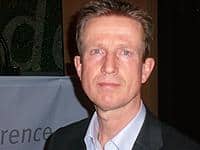Dr Klingenberg, who also runs Europ's IMPEL team monitoring transfrontier shipments, was speaking at the recent BVSE trade association paper conference in Germany, where he commented on continuing concerns about illegal exports and the growth in shipment volumes.

I agree with the Environment Agency that a trivial amount of contamination in the paper is not a problem.
Dr Albert Klingenberg, IMPEL
He said: “At the port of Rotterdam now we are handling about 5 million tonnes of recyclables – 'waste' – of which about 2 million tonnes is recovered paper. 37% of this is going to China and 90% of the waste coming in and out of the Netherlands destined for non-OECD countries passes through Rotterdam.”
Dr Klingenberg said that non-OECD countries want notification for the importing of waste paper. “These regulations are a very high priority for us but we can't work alone, we have to work with Customs and the police.”
While a lot of the trade carried out is legitimate, said Dr Klingenberg, “there are still 150 reports of offences going to the district attorney. Fines of about 450 Euros (£345) per tonne will be charged.”
Of specific concern, said Dr Klingenberg, is low quality shipments of “mixed wastes”. He told the conference that the authorities were convinced that there are more illegal paper shipments than are currently being found, and that “malafide companies were the cause of bad reputations.
“The Inspectorate wants to cooperate with bonafide companies. Last year we had concerns about the English company Grosvenor, and we still have special concerns about shipments from UK, Ireland and Germany,” he said.
The paper recovery industry had its own part to play in ensuring fair and legal trade, said the official. “We need compliance with waste shipment regulations and other legislation and should not export commingled waste. Guarantees are needed for clean recycling facilities in non-OECD countries and trade associations in Europe should reject doubtful or criminal companies as members and inform inspectorates about these companies.”
The aim of IMPEL, said Dr Klingenberg, is more effective implementation of environmental legislation as well as a greater consistency of enforcement. Set up in 1992, he explained that it is a “co-operation unit” and represents an informal network of regulators with the support of the European Commission.
Speaking to letsrecycle.com, the regulator said that the Port of Rotterdam has “special links with the UK in the wake of the Grosvenor affair. We have had good cooperation with the Environment Agency and I was also in talks recently with the Environment Agency. They decided to have a programme for one year to co-operate on waste regulation. On the other hand we still have concerns about material coming from the UK and Ireland from commingled waste.”
Trivial
Dr Klingenberg added that one of the problems is that paper is not collected separately because of commingled collections and there is a tendency to trade this. The official acknowledged that there had been discussions of whether percentages of contrary materials, such as plastic bottles in bales of recovered paper could be allowed.
But, he told letsrecycle.com that there had been no agreement in terms of a percentage amount being allowed. However, he accepted the Environment Agency line on the use of the word “trivial” in terms of what can be acceptable and said: “I agree with the Environment Agency that a trivial amount of contamination in the paper is not a problem.”
The word “trivial” has been given to letsrecycle.com by the Agency as an indication of what might be acceptable.
To take this aspect of legislation further, Dr Klingenberg said that results of research for the Dutch authorities should be available in July 2008. These results will come following talks with industry sectors as to what levels of contamination are acceptable at the reprocessing stage.
He explained: “In the Netherlands we are looking at what is acceptable. There is no mention of a percentage but in our investigations we want to ask what they think is acceptable and you will get some answers I hope in July.”











Subscribe for free